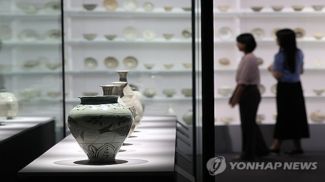BEIJING, 10 June (BelTA - China Daily). - Audiences returning to concert halls around the country.
At 7:30 pm on Sunday, some 40 days after canceling all of its scheduled concerts, the China NCPA Orchestra, the resident ensemble at the National Center for the Performing Arts, returned with a livestreaming concert at the venue.
The online performance officially marked the reopening of the NCPA to concert audiences the following day.
The orchestra performed two of German composer Ludwig van Beethoven's best-known works, Symphony No. 5 in C minor Op. 67 and Symphony No. 3 in E flat major Op. 55, under the baton of conductor Lyu Jia.
Despite the lack of a physical audience, the concert attracted more than 21 million views on social media platforms.
Gong Jicheng, vice-president of the NCPA, said, "We prepared for this concert for several weeks because we knew that one day we would resume our performances."
From April 26 to Sunday, the NCPA canceled more than 140 concerts and public events due to the COVID-19 outbreak.
Lyu, also the NCPA's artistic director of music and the China NCPA Orchestra's music director, said the performances of the Beethoven symphonies were dedicated to audiences who badly missed attending live concerts during the outbreak.
Symphony No. 5 in C minor, Op. 67, also known as "Destiny" is arguably one of the composer's best-known works among music lovers in China and around the world.
Lyu said, "This symphony has been given numerous interpretations, but is generally understood to express the positivity and determination of humanity to never give up when faced with a tough situation.
"We chose to perform it during the first half of the concert because it reflects the difficult situation that we have experienced lately-especially the symphony's ominous four-note opening motif, which is often interpreted as the musical manifestation of fate knocking at the door."
Lyu said Symphony No. 3 in E flat major Op. 55, also known as the "Eroica", was performed to signify the heroism shown by everyone.
"We've overcome all obstacles to return our lives to normal. In particular, this performance is a salute to the heroes of the outbreak-the medical personnel, delivery riders and others whose jobs suddenly put them at a greater risk," Lyu added.
At 5 pm on Sunday, the NCPA opened ticket sales for the concert the following day, which again featured Lyu conducting the orchestra in the two Beethoven symphonies. It was the first live concert with a physical audience staged in Beijing since the local outbreak was brought under control. According to the NCPA, tickets sold out within four hours.
Gong said: "To keep audiences engaged, the NCPA staged nine online concerts, which attracted about 200 million views. However, virtual concerts cannot replace the joy of attending a live performance."
Emotional night
Violinist Ma Weijia said: "It was a long time since we had performed together. It was a very emotional night for all of us. We returned for rehearsals on June 1, but due to the outbreak, no one was 100 percent certain that the concert would take place. However, I could sense that the musicians and the conductor were ready for the performance."
The orchestra rehearsed each day from June 1 to Saturday. On Sunday afternoon, the musicians performed the two Beethoven symphonies, and again a few hours later during the livestreaming concert.
Ma said: "Although there was no audience sitting in front of us, we were extremely nervous before the concert, which we knew would attract a large number of views. I understand that we were the first performing arts group in Beijing to stage a live concert in the city since the recent COVID-19 outbreak. It was inspiring and exhilarating for the musicians and the audience."
From April 30 to May 12, Ma was quarantined at a Beijing hotel after becoming a secondary close contact of a patient who tested positive for COVID-19.
Not knowing what to expect, he packed everything he could think of before heading to the hotel. The first things on his list were his violin, music scores, books, tea and a teapot.
He quickly adapted to life in quarantine, playing his violin for four hours a day, undergoing daily temperature checks and nucleic acid testing in the morning, contacting his family and friends online, reading books, and drinking tea.
"It's definitely been a difficult and stressful time because our lives have been significantly affected by the virus," Ma said.
"However, being isolated in a small hotel room for days on end was not so bad. I used the time to do things I like, and I could concentrate on them without any distractions. It was like meditation. As a violinist, the stage is my life. The pandemic has taught me to love the stage more than ever before.
"I guessed that we were going to perform the first concert after life in Beijing returned to normal. I knew it would be Beethoven, because his music always gives people hope and strength. Although he composed these works a very long time ago, they are still relevant to us now, especially when we experience difficult times."
As entertainment venues gradually reopen, art troupes are making a return nationwide. The NCPA has updated its June performance schedule, including classical music concerts and ballet. On Thursday, the National Ballet of China started a 10-day run of three works-Dunhuang, an original Chinese ballet, and the classic Western productions Onegin and Giselle.
Tour postponed
In addition to Beijing, other cities are welcoming the return of the performing arts scene.
One of the best-selling shows, the Chinese dance drama Poetic Dance: The Journey of a Legendary Landscape Painting, was staged at the Jiangsu Centre for the Performing Arts in Nanjing from June 3 to Monday.
A nationwide tour of the production had to be postponed due to COVID-19.
Dancers and creative teams from the China Oriental Performing Arts Group arrived in Nanjing in the middle of last month, spending 14 days quarantined in hotels before the performances. To continue their rehearsals, the dancers spent many hours together online.
Zhou Liya, a choreographer for the production, said: "Finally, we could step on stage and be greeted by an audience in the theater. We could feel the excitement among the dancers and the audience."
The performances were staged during the Dragon Boat Festival holiday. Tickets sold out quickly, so the company decided to stage an additional show on Monday. The dancers and creative teams will now travel to Ningbo, Zhejiang province, and Wuxi, Jiangsu, for more shows.
Premiered at the NCPA in August, Poetic Dance: The Journey of a Legendary Landscape Painting, choreographed by Zhou and Han Zhen, was inspired by A Panorama of Rivers and Mountains, a classic artwork by Wang Ximeng during the Song Dynasty (960-1279). The 11-meter-long scroll painting is a record of people's lives and natural scenery at that time, blending realism with creative imagination.
The dance drama, which has received warm audience feedback, is making a nationwide tour, with more than 50 performances due to be held in 20 cities.
Zhou said: "Since the production premiered, we've had to change our schedule due to the pandemic. In each city we've visited, we have been prepared to change our rehearsal and performance times to accord with COVID-19 health guidelines."
Han and Zhou have choreographed dance dramas together since 2015. They have gained a large fan base with works such as The Eternal Wave, adapted from a classic 1950s film that centers on a communist telegrapher who works undercover to fight the enemy. The Eternal Wave has been staged more than 100 times nationwide and is one of China's top box office dramas.
Zhou planned to collect material for new works during the May Day holiday, but she had to cancel these plans due to the COVID-19 outbreak.
"It felt as though a whole month had been stolen from the end of April to early June, which was depressing," Zhou said. "People working in the performing arts scene have learned to cope with the changing situation and tried to strike a new balance."
Chamber music
The Suzhou Symphony Orchestra will mark its return with a concert on Saturday. Zhou Ying, the orchestra's vice-president, said the performance would include chamber music featuring a woodwind quintet, brass quintet and a horn quartet, with programs arranged under the theme "Dancing for Summer".
Works such as Libertango by Argentine composer Astor Piazzolla, and Sing, Sing, Sing by United States jazz drummer Gene Krupa will be performed, along with popular songs by The Beatles and The Beach Boys.
"We've selected some happy and joyful songs for audiences because it's time to celebrate returning to the concert hall," Zhou said, adding that due to COVID-19, the orchestra halted its concerts and public events after a performance on Feb 13.
To connect with audiences, the orchestra launched a series of short videos titled We Need Art, with musicians performing chamber music outdoors near Jinji Lake, a scenic spot in the city next to Suzhou Jinji Lake Concert Hall, the ensemble's home.
"We believe that music is as important as ever," Zhou said.
The orchestra, which was formed in 2016, comprises 80 musicians from a total of 17 countries and regions, including China, Japan, South Korea, the United Kingdom and the United States. The musicians' average age is 30.
Zhou said: "As we have many overseas musicians who do not speak Chinese, we did our best to help them through a difficult time when there were no rehearsals and performances. It was also important to ease their anxiety when they could not return to their home countries to reunite with their families during the pandemic."
Despite the disruption to daily life caused by COVID-19, the musicians practiced at home every day and met online several times a week to play pieces together. To interact with audiences, they also shared their daily practice sessions online.
During the pandemic, overseas musicians have worked as community volunteers to help medical workers.
"Some of the musicians have lived and worked in Suzhou since 2016. The city is their second home, and they even get married here. They've formed a deep bond with Suzhou, especially during the pandemic," Zhou said.













